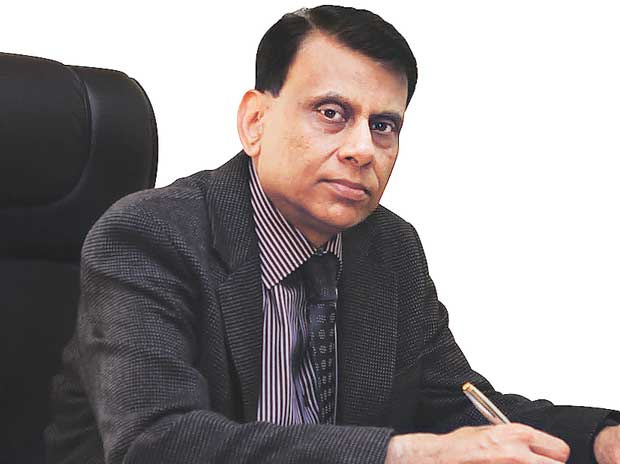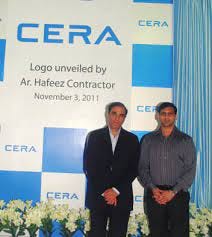Disclaimer: I am not invested in Cera Sanitaryware or any other companies mentioned in the post below. I am not an investment advisor. I love thinking about investing, businesses and entrepreneurs, and this blog is just an expression of that love. This is an article I wrote in the past and is close to my heart. I thought it worth republishing here.
An entrepreneur who I admire immensely is Vikram Somany. I admire him for the way he designed his business, they way he focused on the controllable variables and most of all, his mental strength. His story is worth telling.
Vikram Somany's father along with his brothers set up the first organized sanitary-ware company in India in 1960 - Hindustan Sanitaryware. But later, probably because of the family led business restructuring, Mr. Somany was running a business in the vanaspathi oil (type of vegetable oil used in India) and de-oiled cakes (used in agriculture as fertilizer and animal feed) manufacturing. This was a commodity business and thus exposed to the brutal commodity economics.
Around 1980, Mr. Somany received a license to set up a sanitary-ware manufacturing facility. The business broke-even in the first month itself. This is a stupendous achievement, that too in a complex business like sanitaryware which sees substantial teething issues in the beginning. For Cera a few factors contributed to this:
Mr. Somany staffed Cera with many ex-employees of Hindustan Sanitaryware. The sanitary-ware manufacturing process is prone to defects, and the defects lead to rejects, which can eat into the profits extensively. Hiring of people from the dominant leader meant the business began with extensive institutional domain knowledge.
Mr. Somany took a contrarian view in choosing natural gas fired kilns which had the advantage of being both cheaper and environment-friendly right from the beginning. This advantage was compounded by him setting up the plant near a major oil field with gas prices at very cheap levels. Fuel costs, which are a major cost for sanitary-ware manufacturing, were considerably lower for his business.
The above was backed by considerable customer focus. India was under the license raj then (businesses could be begun only with government licenses), and the average customer had very limited choice in goods to buy. In such a scenario, Cera was the first to produce colourful sanitaryware products back in 1980s (21 colours then vs 7 for competitors), when it was a seller's market.
Burning Bridges mental model to sharpen focus
It is the hesitation to take a leap of faith that precludes success and joy. Many have that particular 'something' that they love to do but they do not want to take the leap of faith do the ‘something’ full time. The primary reason remains the assumption that burning of the bridge is 'risky', which might be valid. But if you apply the principle of inversion to the problem, you just might end up with the conclusion that non burning of bridges is riskier.
For when you do just that thing which you love, you harness the power of focus and compounding. It is a natural conclusion that your focus, stamina and eagerness to learn are all stronger and longer in something you love. This is akin to increasing the rate and tenure of compounding. Focus, as per Mr. Buffett and Mr. Gates, is the most important ingredient for success in an endeavor, while compounding, as per Mr. Einstein is the eighth wonder of the universe. Harnessing these fundamental forces of the universe can lead to- as Mr. Munger would say- ungodly results.
And so, we turn the notion 'Burning bridges is risky' on its head - Burning bridges, at times, can be the most conservative decision that one can take.
What has all this got to do with Cera? Well, in 2001, Mr. Somany decided to exit the commodity segment entirely and focus purely on sanitaryware. This decision is extremely important - in those times (and even now), the focus of majority of the entrepreneurs and managements was to grow their ‘empire’. Size meant success. Mr. Somany, by selling the business that he spent most of his life running, showed remarkable maturity.
This allowed Mr. Somany's entire entrepreneurial energy to be focused on just one business. This decision was well thought out. The sanitaryware business by then had become quite profitable, and 20 years was enough to understand the difference in economics between the businesses. He realized that sanitaryware business inherently has better and more stable margins and return profiles as compared to the flagship commodity business.
This aggressive decision was probably in retrospect, the most conservative decision he took till then. We will see how.
Vidush Somany enters; Creating a network of competitive advantage
Cera, which was run in a decentralized manner for long, moved from strength to strength since 2001. The progress was accelerated by the entry of Vidush Somany, Mr. Somany's only son into the business in 2004.
From 2002-2012, sales improved nine-fold, PAT margins improved nine-fold while returns went from mid-single digits to low-30s. The improvement was steady and sustainable. This stupendous performance was driven by a series of measures which created a network of competitive advantages -
Quality focus: Even when it was a tiny entity with sales of less than $10 million, the Somany family spent considerable amount to improve its manufacturing process by employing foreign consultants. In 2008, he also employed a ceramic scientist of repute on their board. The focus was cost reduction, quality improvement and efficiency maximization. The focus on constant improvement in their knowledge became part of the company DNA.
Economies of scale: Cera also made a decision to expand at their existing facility at Kadi, Gujarat harnessing the power of scale economies. Simultaneously, the company spent considerable efforts in strengthening and expanding their distribution network. This further improving the cost advantage.
Avoiding competition: The focus was initially on the mass / value segment in the initial stage of the journey. Sanitaryware is a bulky item which is prone to breakage in transit. And so, only premium sanitaryware was economically viable to be exported. Thus, Cera's target market had no foreign import led competition. This was as opposed to the incumbent giant - Hindustan Sanitaryware's focus on the more crowded premium segment.
Branding: Right since 2001, the family's focus on brand was evident in the spending of more than 4% of revenues on average on brand building efforts. This allowed it considerable pricing power and allowed it to further leverage his passion for conservative-aggressive strategies. For example, when the decision was taken to enter into the related segment of faucets, Cera decided to first outsource production and sell it under its own brand to test the market. This indication a cautious expansion of circle of competence into a related segment without sacrificing growth.
The net result is that the Somany family led Cera saw its market share moving from mid single digits to around 20% in a decade.
Over the years of its evolution, while Cera was continuously outpacing the industry growth rate, Mr. Somany was oft asked a question, ‘When do you think Cera will become the largest player in India?’
Mr. Somany’s response across time, was consistent: 'We have no aspirations to be No. 1 or No. 2. If our growth is good, our service is good and our quality is good, then I think our results will be a consequence of this growth and innovation.'
A pattern we find in exceptional entrepreneurs is that their personality percolates into the organization they lead. This can be observed in Cera as well. In conference calls across different years, the top management responds similarly to questions on market leadership - that the focus is manufacturing good products, marketing them well and ensuring they are available when the customers need them; and then the outcome will take care of itself.
In short, the focus is the process and not the end-result.
The unthinkable
Vidush Somany, eventually appointed as the Executive Director of the business, was fully involved in running it while Vikram Somany was slowly taking a back seat. The former, backed by an able team, had proved himself with the company's revenues and profits increasing by more 20%-25% every year since his joining.
And then the unthinkable happened. In Aug 2012, there was news of the sudden demise of Vidush Somany. A parent surviving his / her child is one of the worst things to happen. The excruciating mental agony cannot be imagined.
While I do not know how Mr. Somany dealt with this loss in his personal life, I believe how he dealt with the crisis in the business is simply extraordinary. Mr. Somany had always had a strong focus on delegation and employee empowerment.
In the past, an employee earned more than Vikram Somany himself, an indication of his ability to recognize and pay for talent, and lack of ego. This trait helped him deal with the vacuum created by his son's demise, when SC Kothari - a long-timer who had retired in 2009- returned to take up the role of CEO within a couple of weeks. In a few months, a new COO was appointed, again from within the ranks. Simultaneously, the founder continued to buy shares from the open market indicating his faith in the business.
The Company continued to focus on its core initiatives as articulated by Mr. Somany previously - quality, service, distribution. In fact, since 2012, a period marked by weak economic sentiments, GST, demonetisation, etc, the revenues and profits of the company went up 6x with the return and profitability metrics continuing to remain strong.
Eventually he brought his daughter, Deepshika Khaitan, on to the board as the non-Executive Chairman to further indicate the family's long-term intention to be part of the business.
For me, the grace and strength with which Mr. Somany dealt with this tragedy is worth remembering and emulating. It helped me in dealing with certain tragedies in my life as well. And the story of Mr. Somany reminds of a couple of Munger's quotes that I love
- “You should never, when facing one tragedy, let it increase to two or three through failure of will.”
- "I don’t care what the cause, your child could be dying of cancer, self-pity is not going to improve the situation. It’s a ridiculous way to behave, and when you avoid it you get a great advantage over everybody else, almost everybody else, because self-pity is a standard condition and yet you can train yourself out of it.”







Thank you for the wonderful insights. Vikram sir is truly a man of culture.